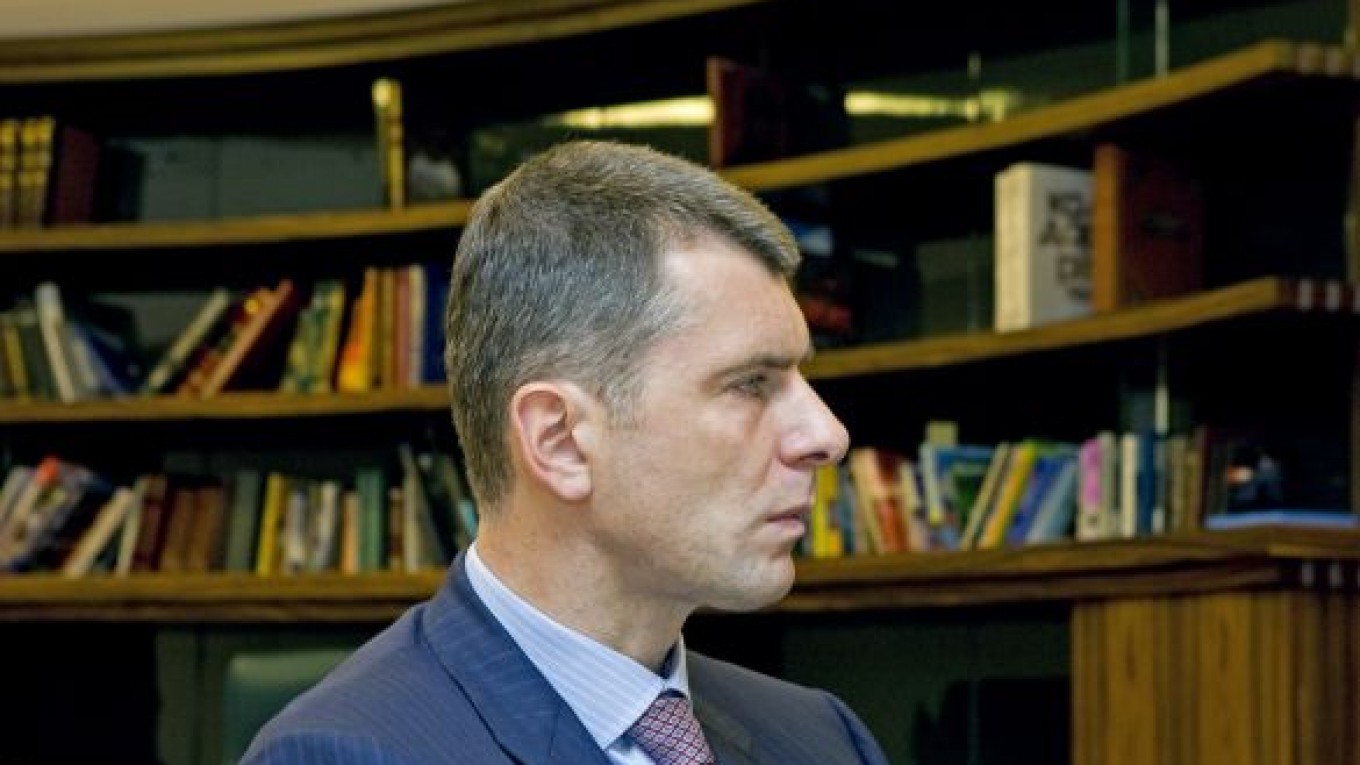Russian tabloid journalists adore scandal-prone billionaire-turned-politician Mikhail Prokhorov. Once he began to head the Right Cause party, it was also drawn into a series of highly publicized scandals, proving, perhaps, that the party apple does not fall far from Prokhorov’s tree.
First, the party’s liberal core supporters were amazed to learn that Right Cause was attracting nationalists. In an interview with Izvestia, Boris Nadezhdin, head of the party’s branch in the Moscow region, admitted that “young skinheads are joining the party in droves.” (Nadezhdin later retracted his words.)
Then, in early August, there was a scandal over the Prokhorov billboards that were put up in major cities. Several hundred of them were taken down by rope-climbing repairmen, and the ad contracts were canceled. Prokhorov blamed the removal on local authorities loyal to United Russia.
Then, Izvestia published parts of a document called “one of the final versions of the Right Cause platform,” which they characterized as being “farther to the left than the Bolsheviks.” After it came to light that the document had nothing to do with Right Cause, Prokhorov on Friday published an authentic draft of the party’s manifesto called “The People Are the Power.” Judging by the flurry of activity in the blogosphere, the document was interesting. Or maybe bloggers are just interested in the party because it’s the only one with unpredictable election results. ?
In any case, most commentators were simply baffled by it. The draft manifesto reads as if it had been cut and pasted together from texts by a variety of parties, sometimes at opposite ends of the political spectrum.
For example, the draft notes that the country is in crisis. “Law does not function. It has been replaced by arbitrary and outrageous abuses of power by the authorities. The state is hostile to its own people. … Furthermore, we don’t produce almost anything ourselves. Outside of the major cities, there is almost a feudal system.”
But the methods proposed to correct the crisis are meek. While the manifesto asserts that Russia “is reverting to its Soviet past” — largely because private businesses in “strategic” sectors are being overrun by state-run monopolies — it does not propose any measures to reform state monopolies except regulating prices of goods and services. The monopolies themselves are advised to do nothing more than “begin to cut their losses and optimize capital investment.”
The draft declares that the party’s goal is to re-establish an independent judiciary and the equality of citizens under the law. But to achieve this goal, it does not even dare to propose that judges be elected, except for the lowest level of justices of the peace.
In the end, the document creates a strange impression. It is as if Abraham Lincoln called for an end to slavery by offering free medical insurance for slaves.
Nonetheless, the document does contain a number of demands that are appealing to democratic-minded voters. It proposes limiting the excessive powers of the president, giving the State Duma the right to impeach the prime minister, introducing referendums on a regular basis, simplifying the process of registering parties and privatizing some state services.
These demands are dear to the heart of the democratic opposition. Blogger Anton Nosik wrote on his LiveJournal blog that the Right Cause draft “is like a short TV version of the platform of the Solidarity oppositional movement.”
Regardless of the inconsistencies in Prokhorov’s manifesto, however, the main asset of Right Cause is that it is the only party to offer any whisper of change to democratic-minded voters. Next to his political competitors, Prokhorov looks like Prince Charming among the dwarfs, and this advantage might give his party enough votes to overcome the 7 percent threshold to get into the Duma.
But in Russia, experience has shown that the number of people voting for a party might be considerably different from the number of recorded votes — either much greater or much smaller, depending on the creativity of the election committees. That means it is impossible to predict the chances for Prokhorov’s party. And it is hard to say whether his manifesto will become a program of future reforms or just another useless political declaration.
Victor Davidoff is a Moscow-based writer and journalist whose blog is .
A Message from The Moscow Times:
Dear readers,
We are facing unprecedented challenges. Russia's Prosecutor General's Office has designated The Moscow Times as an "undesirable" organization, criminalizing our work and putting our staff at risk of prosecution. This follows our earlier unjust labeling as a "foreign agent."
These actions are direct attempts to silence independent journalism in Russia. The authorities claim our work "discredits the decisions of the Russian leadership." We see things differently: we strive to provide accurate, unbiased reporting on Russia.
We, the journalists of The Moscow Times, refuse to be silenced. But to continue our work, we need your help.
Your support, no matter how small, makes a world of difference. If you can, please support us monthly starting from just $2. It's quick to set up, and every contribution makes a significant impact.
By supporting The Moscow Times, you're defending open, independent journalism in the face of repression. Thank you for standing with us.
Remind me later.


